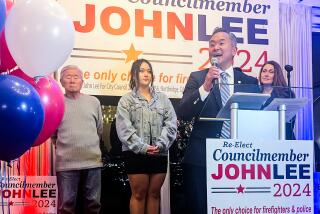3 of 6 Major Mayoral Candidates Skip Forum on the Working Poor
- Share via
When it came to a serious debate on the issues involving the working poor, some of the current crop of mayoral candidates were not around to be counted on.
That, at least, was the sentiment expressed by many in the crowd of nearly 2,000 people who gathered Sunday at Los Angeles Trade Tech for a candidates forum and found only half of the six leading candidates in the April 10 election.
“I thought more of the other candidates would come,” said Mary Gonzalez of Pacoima. “It tells me that they think our vote doesn’t count. It’s their loss.”
Even those candidates who attended the packed forum in the Grand Theater--Rep. Xavier Becerra, former Assembly Speaker Antonio Villaraigosa and commercial real estate broker Steve Soboroff--were unable to escape the heat.
Councilman Joel Wachs, City Atty. James K. Hahn and state Controller Kathleen Connell were the no-shows.
“We need the same education and opportunities as the millionaires of this city,” union leader Maria Elena Durazo told the cheering crowd.
The forum was called an “accountability session” to focus on such issues as affordable housing, worker rights and a shortage of access to health care.
It was hosted by the L.A. Metro-Industrial Areas Foundation, a coalition of more than 70 churches, labor unions and community organizations warning that Los Angeles will suffer a crisis if new measures aren’t taken to alleviate the problems of the working poor.
Their message was echoed by another church-based group--Clergy and Laity United For Economic Justice--which on Friday released a “Declaration of Conscience.”
Among other things, it called for candidates to agree to support increased wages and union organizing and to encourage developers and businesses to provide child care for their workers.
“We will not let this assault, this arrogance toward workers’ rights, continue,” said Rabbi Steven Jacobs of Temple Kol Tikvah in Woodland Hills, during a recent news conference. It was held to criticize the mayoral candidates for not championing the working poor more aggressively. “There is an economic apartheid in America that needs to stop,” Jacobs added.
L.A. Metro had worked toward setting up Sunday’s debate for several months, holding hundreds of meetings in churches and schools throughout the county.
Before any questions were asked, the candidates heard stories from city residents who spoke about what life was like below or near the federal poverty line.
A social worker in the Mid-Wilshire area talked about seniors too poor to buy medicine. A nursing home worker in South-Central Los Angeles said she was fired from her job after fighting for better wages and health benefits.
The three candidates reciprocated the audience’s passion.
“Health care is not a privilege; it’s a right,” Becerra said, agreeing with his opponents that the city should spend $10 million annually for 25 years in tobacco lawsuit proceeds on health care in Los Angeles.
Answering a question about new after-school programs created by the mayor’s office, Villaraigosa promised joint efforts with the Los Angeles Unified School District, philanthropic groups and the state and federal governments to keep more children off the streets. The others agreed.
Responding to a suggestion to create a $100-million-per-year low-income housing fund, Soboroff agreed with other candidates, saying the local government “needs to put its money where its mouth is.”
And all candidates said more should be done to encourage immigrant rights in Los Angeles and reduce fraud against new immigrants.
After the forum, Armando and Guadalupe Garcia said they wanted to believe that the candidates were sincere. But they also said they have heard many political promises before that were never kept.
“We’ll see what happens,” Armando Garcia said. “What they’re saying now sounds good.”
More to Read
Get the L.A. Times Politics newsletter
Deeply reported insights into legislation, politics and policy from Sacramento, Washington and beyond. In your inbox twice per week.
You may occasionally receive promotional content from the Los Angeles Times.








